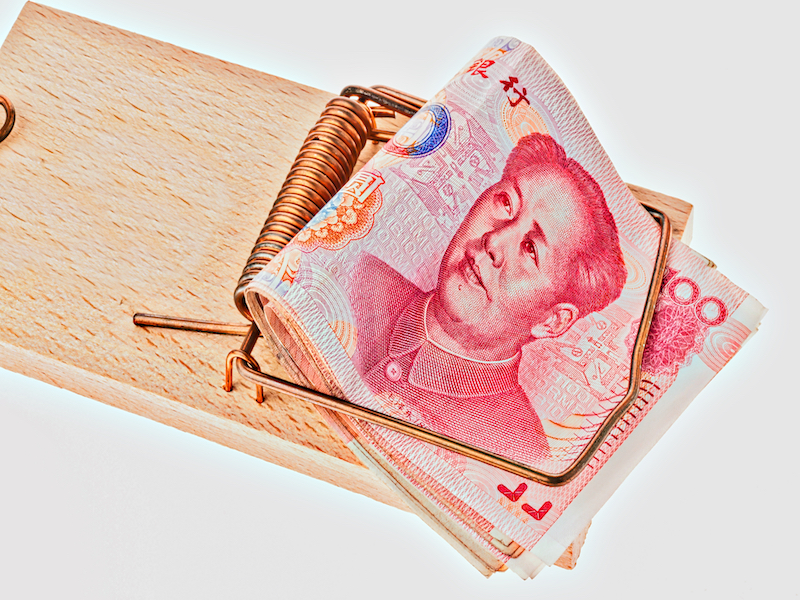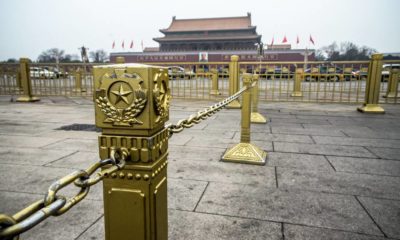Bankruptcy
Is China Digging Itself A Bigger Debt Hole?

There is a growing consensus that China has a massive debt problem that is only going to get worse without a serious overhaul.
China repeatedly tries to prop up her economy with the creation of new credit, which may or may not prove sustainable in the long run.
Goldman Sachs, in particular, has raised questions about the validity of China’s reported numbers, and now their analyst, Andrew Tilton, has charted out some of the problems.
China Reached a New Credit High in the First Quarter of 2016

As the chart shows, China created a new credit of nearly 3.5 trillion yuan at one point in the first quarter, and Goldman Sachs says the total for the quarter was something like $1 trillion dollars.
Needless to say, that’s a humongous amount, and without serious economic growth to sustain it, China may come to regret its debt practices.
It cannot be ignored that China is hugely over-relying on debt, and treating it like the solution to all of its problems.
The United States has already learned the hard way that this will not work forever.
[ms_divider style=”normal” align=”left” width=”100%” margin_top=”30″ margin_bottom=”30″ border_size=”5″ border_color=”#f2f2f2″ icon=”” class=”” id=””][/ms_divider]
[ms_featurebox style=”4″ title_font_size=”18″ title_color=”#2b2b2b” icon_circle=”no” icon_size=”46″ title=”Recommended Link” icon=”” alignment=”left” icon_animation_type=”” icon_color=”” icon_background_color=”” icon_border_color=”” icon_border_width=”0″ flip_icon=”none” spinning_icon=”no” icon_image=”” icon_image_width=”0″ icon_image_height=”” link_url=”https://offers.thecapitalist.com/p/warrenbuffet/index” link_target=”_blank” link_text=”Click Here To Find Out What It Said…” link_color=”#4885bf” content_color=”” content_box_background_color=”” class=”” id=””]Warren Buffett Just Told His Heirs What He Wants them To Do With His Fortune When He Dies. [/ms_featurebox]
[ms_divider style=”normal” align=”left” width=”100%” margin_top=”30″ margin_bottom=”30″ border_size=”5″ border_color=”#f2f2f2″ icon=”” class=”” id=””][/ms_divider]
Shadow Lending May Mean These Numbers Are Skewed
- These numbers may be an underestimate as China has a phenomenon known as shadow lending, which is not subject to normal regulations.
- Shadow lending remains off the financial books, while still adding to the overall amount of debt in the country.
- Goldman is particularly disturbed by the lack of accountability involved in this process.
China’s Debt-to-GDP Ratio is Growing

The chart above shows China’s debt-to-GDP ratio and how far it has gone up in recent years.
According to CNBC, this is reflective of the fact that credit is now going to pay for existing debts instead of feeding into the growth of the economy. It’s a vicious cycle that can only work for so long before it finally tanks.
The economy is slowing down even as debt rises, and Goldman points out that the amount of debt China carries is far larger than anyone thinks it is, due in part to shadow lending and due in part to the fact that China’s self-reporting is skewed, to say the least.
Needless to say, Goldman believes that Chinese banks don’t play fair with the regulations and that this only furthers the difficulties the country is facing with debt.
Zombie Businesses Live Off Credit and Drive Down Prices for the World
China is currently home to some of the so-called zombie businesses—steel and aluminum producers that are kept alive by the government.
These businesses overproduce, saturating the market and making it impossible for themselves to make a living except through credit and government lending.
The Washington Post reports that banks owned by the state simply roll these company's loans over and let the manufacturers get on with their business.
While there are good human reasons for trying to keep these businesses alive—for one thing, the loss of jobs alone would be stunning—they ultimately help neither China’s economy nor the world’s.
An overhaul of China’s social-services system may be necessary to help those who would be put out of work.
The Washington Post Suggests Possible Remedies for Zombie Businesses
- Retraining programs to prepare workers for service jobs
- Strong pensions to incentivize retirement in those close to the right age
- Relocation programs to move workers to available jobs
- Putting money into education and health to create jobs
Unfortunately, the Greater Debt Problem as a Whole May Not Be So Easily Solved.
With the entire economy essentially kept afloat by debt, China is sitting on one heck of a bubble.















